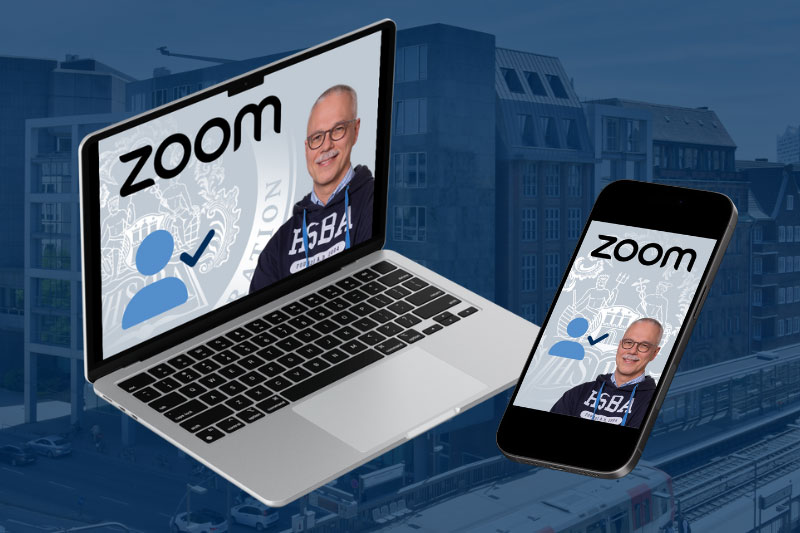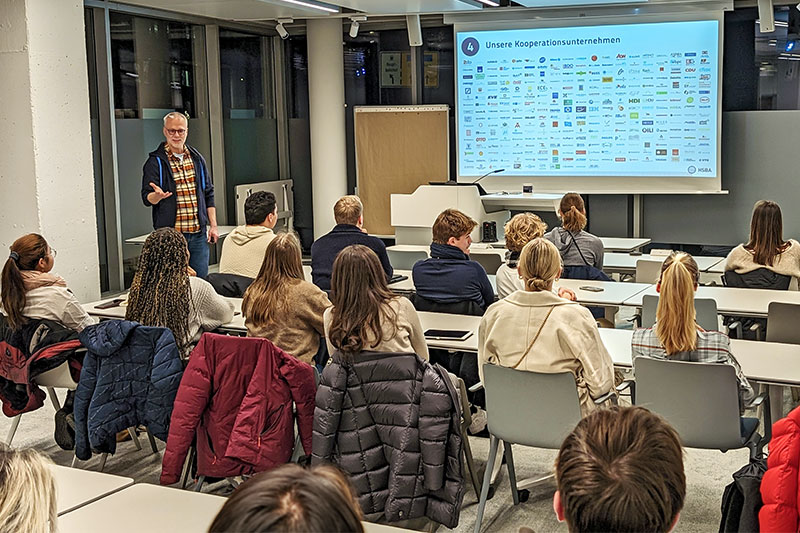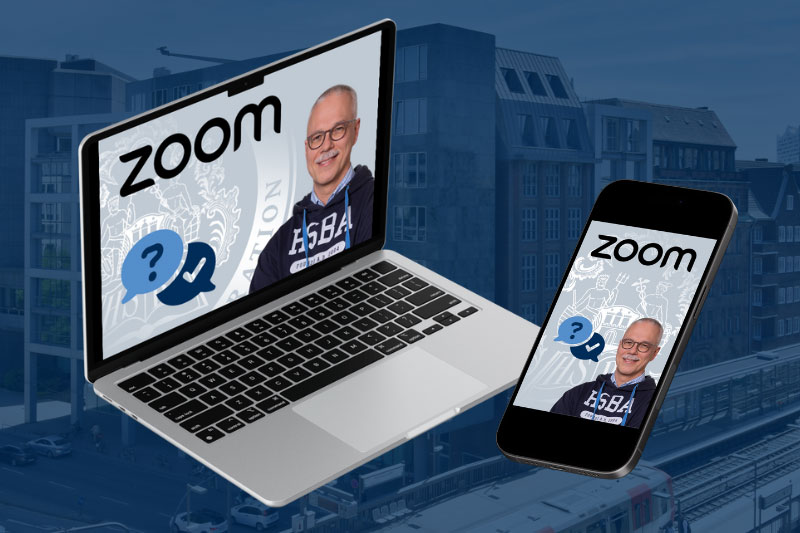Please activate Javascript in your browser to use this service on this page.
The academic head Prof. Dr. Sarshar explains the focus and the special features of the dual undergraduate degree programme in Business Informatics.
With a comparatively large share of practice-based content for a business informatics degree, the study programme is geared to activities on the interface between traditional business functions on the one hand and IT on the other. While all important aspects of business (finance, marketing, accounting, economics, human resources …) will be dealt with in the business administration part of the programme, the business informatics part will focus on software (design, programming, software engineering and project management). Other central areas of informatics, for example database systems, will round off the course schedule. Students can use electives to specialise either in business administration or in business informatics.
The dual programme integrates phases of theory at the university (on average 32 weeks a year) and practical phases of training in their training company (on average 20 weeks a year).
Students acquire an in-depth knowledge of informatics in combination with a wide range of business knowledge. In the first two years of study, students will be taught the fundamentals in the core business subjects and introduced to the basics of informatics. They will complete several independent programming projects alongside their studies. Methodology modules will complete the course schedule. In the second year of study, the share of informatics modules will increase. The third year of study features extensive elective options (required electives).
Teaching of basic mathematical knowledge; transfer of economic problems into mathematical approaches; and application in practice.
Legal regulations auf accounting, accounting procedures, account charts, accounting processes including annual financial statement postings, problem-oriented application of full and partial cost accounting.
Teaching of selected approaches, methods and instruments of personnel management and leadership, analysis of common personnel and leadership situations, application to current practical tasks.
Gain basic knowledge of informatics using business information and application systems for computer-aided design, control and processing of business processes, basics and potential uses of databases and their implementation in companies.
Principles and fundamentals of scientific knowledge acquisition in business administration; examination of long-term framework conditions of the economy (megatrends); examination of political-legal, ecological, socio-cultural and technological influencing factors.
Usage of statistical concepts; especially probabilities and probability distributions, sample size, significance, causation, correlation, linear regression.
Students shall
Understand how companies raise money to finance their investments; realise the role of the financial manager in a business organisation and the effects of financing decisions on the market value of a firm.
Get a holistic academic and theoretical understanding of marketing management, its main components as well as the implementation of such knowledge and expertise to real business situations.
After successful completion of the module, the students are able to explain basic concepts and frameworks of modeling; master essential modelling methods for process, data and software modelling and can apply them; have an overview of common modelling tools and are familiar with the application of a tool; can categorise advanced modeling topics such as reference modeling and understand their benefits for the company.
Basics of market research and data collection; development of questionnaires for statistical surveys; time series analysis, cluster analysis, software application.
Basic knowledge to implement projects within the available time and cost frame as well as the required quality, overview of the most basic instruments and methods of project management; structure, plan, control and manage projects of medium complexity.
The students should receive an introduction to the topic of database systems and in particular
The students
The module conveys technical programming knowledge for the use of the HTML/CSS markup language, based on the questions dealt with in the course of study.
Operations Management: basic insight into the physics/logic of operations, recognition of OM problems and finding appropriate methods to solve them.
Operations Research: unterstanding of different types of optimisation methods and their benefits and limitations in practice.
Become familiar with basic strategic concepts, selected process, organisational and business model innovations, and innovative starting points in new and existing companies, "big-picture" overview of companies and their capabilities and develop an understanding of change.
Understand organisations; exploration of organisation theory; get to know dimensions that describe specific organizational design traits and structures.
Understanding the basics and the methodology of microeconomic theory, assess the economic impact of economic develepments, public sector activities and policies on firm behaviour, household behaviour, market outcomes and economic welfare.
The students
The students receive an introduction to the essential legal aspects of business information, especially in the areas of data protection and copyright law as well as in the software sector. Basics of labour and contract law should also be discussed.
Students shall
A minor comprises two courses in the 5th semester and one course in the 6th semester (a total of 18 ECTS).
You can choose from a wide range of current topics. The electives are reorganised every year.
Since the bachelor's thesis is time-consuming and individual, it can be written in different semesters. Registration for the bachelor's thesis is possible once 120 ECTS can be proven.
A minor comprises two courses in the 5th semester and one course in the 6th semester (a total of 18 ECTS).
The students will be able to
Since the bachelor's thesis is time-consuming and individual, it can be written in different semesters. Registration for the bachelor's thesis is possible once 120 ECTS can be proven.
In the 3rd year of study, you have the opportunity to specialise by choosing a minor.
A minor comprises two courses in the 5th semester and one course in the 6th semester (a total of 18 ECTS).
You can choose from a wide range of current topics. The electives are reorganised every year.
The general electives give students the opportunity to develop their individual knowledge and skills further. The offering ranges from social skills and IT seminars to studium generale events and smaller electives where students can tackle selected business administration content in a more in-depth manner. Foreign language courses are also on offer on an extracurricular basis.
A special highlight for all students is the study trip. The excursions, which span several study programmes and include numerous company visits and lectures, are organised independently by the students. Current topics such as digitalisation, the start-up scene in Silicon Valley or emerging countries frame the content of the individual destinations.
Der Minor besteht aus den Modulen Steuerlehre 1 & Steuerlehre 2 sowie Entscheidungsorientierte Steuerlehre (Modul 3). Es wird empfohlen, den Minor Unternehmensrechnung ODER den Minor Grundlagen der Wirtschaftsprüfung als ersten Minor vor dem Minor Betriebswirtschaftliche Steuerlehre zu belegen.
Steuerberatungsgesellschaften sind Dienstleister der Wirtschaft und in dieser Rolle unerlässlicher Partner der Unternehmen. Steuerberater geben der Unternehmensführung eine wichtige Hilfestellung in allen steuerlichen Fragestellungen und Analysen.
Der Minor deckt wichtige Grundlagen für erfolgreiches Marketing, sowie Sales- und Retail-Management ab. Die Analyse der Kundenwünsche, die Gestaltung der Kundenerlebnisse als Customer Journey und CX sowie die Erfolgsmessung von Management-Entscheidungen stehen im Fokus des Minors. Das konkrete Arbeiten mit quantitativen Daten in einem Data Analytics Project rundet den Minor ab.
Der Minor vermittelt praxisnahe Grundlagen, Managementkompetenzen und technische Einblicke in Informations- und Cybersicherheit. Ziel ist es, Studierende für aktuelle Bedrohungen, Compliance-Anforderungen und Schutzmaßnahmen zu sensibilisieren und zu befähigen.
Das Modul vermittelt Grundkenntnisse im Bereich Data Science und künstliche Intelligenz. Inhaltlich bauen Teile der Vorlesung auf Statistik auf. Module: Data Science, Künstliche Intelligenz, Case Studies zu Data Science und künstlicher Intelligenz.
Der Minor widmet sich insbesondere den Geschäfts- und Erlösmodellen der Medienbranche vor dem Hintergrund der digitalen Transformation sowie eines sich stetig ändernden Mediennutzungsverhaltens. Dabei werden insbesondere die Erfolgsfaktoren von Medienprodukten und verschiedenen Technologien untersucht sowie wichtige Grundlagen in den Bereichen Online-Marketing und E-Consumer-Behavior vermittelt. Der Minor setzt sich aus den drei Modulen Media Management, Online Marketing Intelligence sowie Content Development zusammen.
Der Minor Finance besteht aus drei Modulen, die z.T. nebeneinanderstehen und z.T. aufeinander aufbauen. Er besteht aus den Modulen Grundlagen Finance, Risikomanagement und Mergers & Acquisitions (M&A). In Kombination mit dem Minor Financial Markets ergibt er den Major Finance and Financial Markets.
Der Minor Grundlagen der Wirtschaftsprüfung kombiniert die betriebswirtschaftlichen Grundlagen mit den speziellen Anforderungen im Bereich der Wirtschaftsprüfung und Beratung. Wirtschaftsprüfer sind wichtige Partner der Unternehmen. Der Minor besteht aus den Modulen Wirtschaftsprüfung 1 & Wirtschaftsprüfung 2 sowie Prüfungsnahe Dienstleistungen (Modul 3).
Der International Management Minor schafft einen allgemeinen Überblick über das Gebiet des Internationalen Managements. 3 Module: Internationales Management, Recht, Rechnungswesen und Steuern, Internationales Personalmanagement und Interkulturelle Kommunikation, Internationaler Handel und Regionalstudien.
Mit dem Minor werden fach- und medienspezifische Kenntnisse vermittelt, die für das Medien- und Kommunikationsmanagement relevant sind.
Der Minor widmet sich den Spezifika der Medien- und Kommunikationsbranche. Dabei stehen die Besonderheiten von Medienmärkten und -produkten, erfolgreiche Kommunikationsstrategien und PR-Kampagnen sowie der Einsatz relevanter Technologien im Zentrum der Veranstaltungen. Der Minor setzt sich aus den drei Modulen Media Markets & Products, Communication & Public Relations sowie Technologies & Content Production zusammen.
Digitalisierung und insbesondere KI haben das Einkaufsverhalten von Kund:innen und Verkaufsstrategien von Unternehmen grundlegend verändert. Vom Aufbau einer Vertriebsorganisation, der Außendienststeuerung bis hin zu strategischen und operativen Fragestellungen im Einzelhandel deckt der Minor die Grundlagen für erfolgreiches Sales- und Retail-Managements ab. Die diskutierten Themenfelder werden in einem abschließenden Projekt mit Praxispartnern konkret angewendet.
Welche strategischen Implikationen hat das Thema Sustainable Innovation für Unternehmen und wie können innovative und nachhaltige Geschäftsmodelle entwickelt werden. 3 Module: Sustainable Business Models, Sustainable Supply Chains, Sustainable Innovation Camp.
Der Minor Unternehmensrechnung vertieft die notwendigen theoretischen Kenntnisse im Rahmen einer Tätigkeit im Bereich der Rechnungslegung in unterschiedlichen Wirtschaftszweigen und vermittelt frühzeitig branchenübergreifende Kenntnisse des externen und internen Rechnungswesens (Modul 1), des Controllings (Modul 2) sowie der Internationalen Konzernrechnungslegung (Modul 3).
Der Minor besteht aus 3 Modulen: Das Geschäftsmodell Versicherung – Funktionsweise und Risikomanagementansätze, Strategisches Management – Ansatzpunkte für Versicherer und Vermittlerbetriebe sowie Digitale Geschäftsmodelle, Innovationen und digitale Geschäftsansätze in der Versicherungswirtschaft.
The dual business programme at HSBA opens up excellent career opportunities. Due to the practical training in the company flanking the theoretical degree courses, more than 90% of our students receive a job offer for the next career step immediately after completing their studies. Whether in human resources management, controlling, marketing, sales, auditing or as a data scientist - with a dual study programme at HSBA, a career in the upper management of nationally and internationally operating companies is virtually guaranteed.

Sören Spiegel successfully completed his dual BSc degree in Business Informatics at HSBA in 2019 and has since been working as a Data Scientist at his training company Ipsos, an international market research company. He was one of the first to write a final thesis on Artificial Intelligence - with great success. His work on the use of artificial neural networks for the text classification of open responses in questionnaires has already been tested in a customer project.
Dear Sören, after your graduation in 2019 you continued working at your partner company Ipsos, currently as a data scientist. What exactly does this imply? What do you actually do as a data scientist?
As a data scientist, it is my job to generate helpful information for our customers from a wide variety of data. The projects have a very wide range of different activities. For example, I am working on a project in which we develop a model for our customer that analyses the buying behaviour of buyers and determines a jump-off probability for each customer. The model thus provides a forecast of how likely it is that the buyer will remain loyal to the company or switch to another supplier. Based on this, our client takes marketing measures to keep the "at risk" buyers loyal.
For another project we developed an application that determines and graphically displays the follower relationships of influencers on Twitter, that are of interest to our customers. This means that we can determine which influencers share how many followers. In this way, our customers can see how their information is spread within the network and which target groups they actually reach.
Even though the two projects are very different, they do have some things in common that hardly any project in data science can do without: the acquisition, processing, analysis of data and the preparation of results.
Did you feel well prepared by your study programme and fit for the new job?
Already within the first semester you get a glimpse of the real working world and - in the course of the dual study programme - you get to know it better and better due to the many practical phases. That's why the leap from Bachelor’s degree to full-time employment is not a big one. We also had a number of useful seminars which also helped to smooth the way into the working world.
The Business Informatics programme prepared me for my current job in that I mastered the basics of IT and programming. I soon realised that it is a very solid basis for acquiring new knowledge and skills easily. For example, I did not have a lecture on the programming language that I now work with every day, but it was very easy to master thanks to the programming skills I learned at HSBA.
In addition to computer science, of course, the BI programme provided us with the basics of business administration and project management. This is absolutely relevant as we often have an advisory function for our customers and need to be able to fully understand the business goals of every customer’s project. Thus together we can find a suitable solution for the problems. Quite a few of our projects result from a joint workshop.
You wrote your thesis on the use of artificial neural networks for the text classification of questionnaires. How did you come up with this topic?
I chose the elective subject Artificial Intelligence with Prof. Dr. Sönke Hartmann in the 5th semester and discovered my interest in the subject area through the lecture and a final project. Afterwards I felt confident that I should also write my Bachelor's thesis on Artificial Intelligence. Therefore I started looking for possible applications in different departments at Ipsos until I found a team that was looking for a method to get more and above all more specific information from open comments in questionnaires. That’s how we came up with the idea of a targeted request for a customer comment in real time and with my bachelor thesis I contributed basic research on the analysis of customer comments with artificial neural networks. And still this is an important basis for my work at Ipsos: the practical application of the method I developed has already been tested in various customer projects.
How did you feel about working with the professors and lecturers at HSBA?
Due to the very manageable study groups – we were less than 20 fellow students – we usually worked in close cooperation with our professors. Questions could be asked at any time during the lecture and tasks were often discussed together and explained repeatedly if necessary. Most professors and lecturers offered support even beyond office hours in case students needed clarification on projects or teaching materials. I particularly appreciated the good cooperation during my Bachelor's thesis. My professor advised me while I was still choosing the topic and he was always available to discuss any problems that arose during my Bachelor's thesis.
What are the theoretical phases like at HSBA? How would you describe the learning atmosphere and the collaboration with fellow students?
The overall learning atmosphere was very pleasant and productive as enquiries and any kind of questions could be answered quickly. Numerous group activities also strengthened the collaboration among students and we paired up in several study groups before the exams. Thus, a number of friendships developed, and we even got to know some of the professors more profoundly over a hot punch at the Christmas market. Altogether it was very interesting and helpful to see what kind of difficult situations the other students were confronted with at work and how they could be mastered using the acquired skills and knowledge.
Do you need to have previous knowledge of informatics and perhaps even be able to programme?
In no case do you need any previous knowledge. Sure, the programming modules are a little easier to start with if you have programming experience, but the courses are designed in such a way that no previous knowledge is required. In my class only very few already had solid programming skills and we all got through the modules successfully.
All in all – what would you say are the most important cross-cutting competences you have acquired during your studies?
Very valuable competences that I could deepen throughout my studies are, for example, the ability to work in a team, i.e. to work constructively in groups, and the ability to impart self-acquired specialist knowledge to others. This is particularly important in customer contact, as it is vital to involve the customer by explaining the hows and whys in a simple and understandable way. Apart from that we had some really interesting seminars where we analysed our own learning behaviour and developed measures to optimise it.
What is your assessment here: For whom is the Business Information Systems degree programme particularly well suited as opposed to the Business Administration degree programme?
I think that the Business Informatics programme is interesting for all those who are interested in digital transformation and would like to help shape it in the future, whether on the development or management side. The programme combines the basics of business studies with the exciting and future-oriented knowledge of the digital economy. With a subsequent Master's degree, it is still possible to specialise in both directions.





Do you have questions that you would rather discuss with our students? In our Ask a student format you will find contact persons for each of our dual degree programmes: Jennifer Kerßens (Business Administration), Clara Wendrich and Yasch Gahi (Business Informatics), Luca Lenniger (International Management), and Kai Hemp (Logistics Management).
Dr Marco Landt-Hayen Strengthens Teaching and Tesearch in the Field of Artificial Intelligence
Over 200 prospective students and guests took the chance to experience HSBA first-hand. The programme featured taster lectures, applicant coaching, information sessions, campus tours and a company fair.
Interview with our alumnus Philipp Joshua Spiegel on machine learning, sensor technology and intrinsic motivation.
No, you apply directly to the company. If you have successfully completed a selection procedure and are offered a place, the partner company will contact HSBA and register you. You can find all current study place offers from our partner companies on our Study Place Exchange.
Our Hamburg Business Speed Dating offers an additional opportunity. It takes place twice a year.
If you have any questions about an admission test, you are welcome to contact us.
Yes. Most HSBA Bachelor students spend time abroad during their studies, sometimes several times. For example, in one-semester exchange programmes at our partner universities, in the one-week study excursions in the third year of study, or by participating in a summer school. Some partner companies also enable students to spend time abroad during the practical phase. Internationality also plays a major role in everyday study life in Hamburg, as HSBA attaches great importance to the internationality of the course content and offers a wide range of English-language seminars.
It is best if you fulfil the admission requirements for our Bachelor's degree programmes beforehand. Or if your previous grades at degree level are in the right direction. Otherwise your application will not usually be successful. IF you have to take an admission test and would still like to apply beforehand, be sure to mention this in your letter of application. Then it will be clear to the company representatives that you know what you are doing!